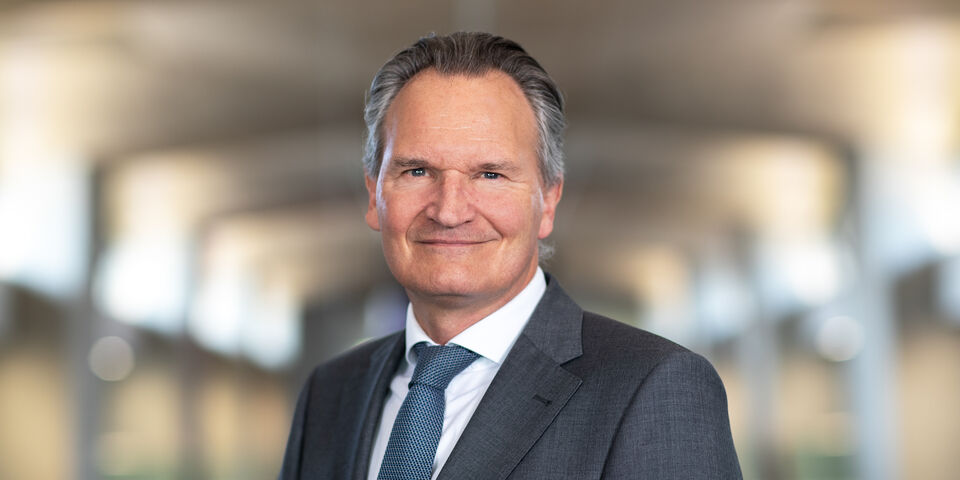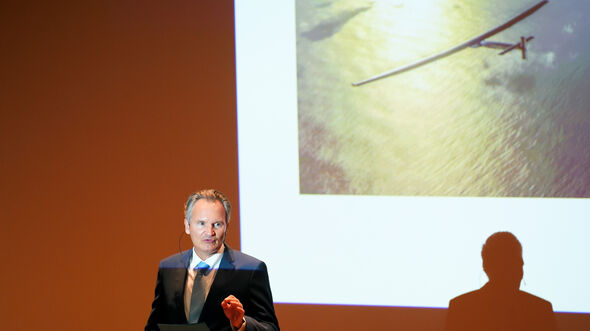President of the Executive Board Smits: “Stormy weather ahead for the academic world”
Politicians in The Hague want to drastically curb the internationalization of higher education. Meanwhile, internationalization is crucial for TU/e’s growth. About 30 percent of students are non-Dutch and more than 50 percent of the 2023 intake was international. “A decrease in the intake would have major consequences for the Netherlands, including for Brainport.”
Robert-Jan Smits, President of TU/e’s Executive Board looks toward the new year with concern, mainly because of the consequences of the elections to the Lower House last November. A parliamentary majority intends to significantly restrict the intake of foreign talent.
Even the current outgoing cabinet is already taking steps to limit the entry of knowledge migrants. Many parties in the Lower House wonder why the Netherlands has to fund the education of international students if they return to their home countries after their studies. One way the cabinet wants to discourage the international intake of knowledge migrants is by once again making the Dutch language mandatory more often in lectures. Education Minister Robbert Dijkgraaf has sent a lengthy letter to Parliament calling for universities to ‘provide more direction’ in managing internationalization.
Exceptions
“Dijkgraaf wants two-thirds of all lectures at the Bachelor’s level to be taught in Dutch again,” Smits points out. “That’s a major problem because 58 percent of academic staff at TU/e are international and mainly communicates in English.” There will be an independent committee that will assess whether an exception can be made for certain institutions. “’Don’t worry, I can make exceptions,’ Dijkgraaf told me. But that doesn’t reassure me because who will be his successor? If that person decides not to make an exception after all, we’re in big trouble.”
There is a lot at stake, Smits emphasizes. “We’re in the midst of major social transitions. Whether it’s about food, energy or climate, it’s the engineers who have to come up with solutions.” Admitting fewer international students will increase labor market shortages even more. “It’s shocking that we’re now faced with this threat. A decrease in intake has major consequences for the Netherlands, including for Brainport. There are a total of 72,000 vacancies here until 2032, 28,000 of which are for higher-educated people (university and university of applied sciences, Ed.).”
Smits is not alone in advocating that knowledge migrants be given ample opportunity. In an interview with NRC, Jeroen Dijsselbloem, mayor of Eindhoven, and Tjark Tjin-A-Tsoi, director of knowledge institute TNO, warn that the business climate and innovation power of the Netherlands are at stake. “You could agree that universities with such a high stay rate are allowed to continue to grow, provided they have sufficient housing,” said Dijsselbloem in the newspaper. According to Tjin-A-Tsoi, the Netherlands relies on its high-end industry: “High-end chemistry, high-end manufacturing, machine building, things like that. We have to safeguard that earning capacity, because only a strong economy can finance the energy transition and maintain our social provisions.”
How many students stay?
The low stay rate is indeed one of the arguments why politicians want to curb the intake of international students. A recent study by internationalization organization Nuffic revealed that only a quarter of international students still work in the Netherlands five years after graduation. The rest either return to their home country or pursue careers elsewhere in the world.
For TU/e, those percentages are much higher, according to Smits. In the previous Nuffic report from 2017, which also included data per institution, TU/e was at the top of the list in the Netherlands with a stay rate of 52 percent. According to Smits, TU/e’s own research shows that about 55 percent of graduates currently stay in the Netherlands. That higher percentage applies to those who still live here 15 months after graduation, so it is not entirely comparable to the Nuffic figures. However, Smits’ argument still stands: international students are important for the economy and future of Eindhoven and the Netherlands.
Currently, 36 percent of bachelor’s students at TU/e are non-Dutch. 24 percent of master’s students come from abroad and for PhD candidates it is as high as 58 percent. And this international intake is on a steep rise. Last year was the first time more international than Dutch students enrolled. Smits: “This allowed us to grow a bit overall.” TU/e now has about 13,000 students, far fewer than TU Delft, for example, which has as many as 25,000 students.
Budget cuts
In addition to new internationalization policies, Smits also expects The Hague to tighten its purse strings for universities. “No matter what the new cabinet will look like, it’s likely that budget cuts are on the horizon.” Combating the Covid-19 pandemic and addressing the energy crisis have cost the government a lot of money in recent years. Due to increased interest rates, which prevent the Ministry of Finance from borrowing “free money” on the capital market, we can expect to see painful choices in the coalition agreement. “We have serious concerns about the budget,” says Smits. “There is stormy weather ahead for the academic world.”
This inward-looking policy is an uncharacteristic development for the Netherlands, Smits believes. “Society is pulling the curtains closed. This trend toward nationalism and putting your own people first has very dangerous sides. We no longer have the openness we once had in the Netherlands. The current trend runs counter to a long tradition. Think of the Portuguese Jews and the French Huguenots; they were oppressed in their own countries, but were given room to develop in the Netherlands. Losing that open-mindedness is going to cost us in the long run.”
Admission of Dutch students
Together with administrators from other universities, Smits did some “self-reflection”: how did we end up in this situation? He names two factors that play a role: the pressure on the housing market in university cities and the accessibility of higher education for Dutch students. Although universities do play a role, student housing is a matter for municipalities. Smits does have an idea of how universities can improve accessibility for Dutch students. “We could say: every Dutch student should be able to study. Universities should guarantee a certain level of accessibility. In concrete terms, that would mean: no limit on enrollments for Dutch students.”
Furthermore, Smits believes that not all universities should be lumped together in the debate about internationalization. “I can imagine that the universities in Amsterdam and Utrecht have no ambition to grow any further. However, those institutions need legal policy instruments for that. For smaller universities, such as TU/e, I believe growth should remain possible, also by recruiting international students. After all, we supply engineers for sectors with major labor market shortages.”
No fence around the Netherlands
And from a demographic standpoint as well, Smits argues that it would not be wise to build a fence around the Netherlands. “Our domestic population will soon start to shrink, and on top of that, many students are choosing to study tourism or communication instead of focusing on science and technology. We really need that international talent.”
The upscaling plans of growing from 13,000 to 24,000 students by 2030 have been put on hold because the government has not allocated the necessary funding. “We needed 380 million euros for that. As long as that money is not available, we can only grow at a very slow pace. I expect we would only reach 15,000 students by 2026. Those upscaling plans will definitely be realized one day,” Smits expects. Why? “Because of the great need for engineers at companies in the region.”
Smits remains hopeful that internationalization will not be rolled back in its entirety. “I should hope that a right-wing cabinet will be committed to the earning capacity of the Netherlands. Exceptions can be made, and I’m counting on that for the technical universities.”



Discussion